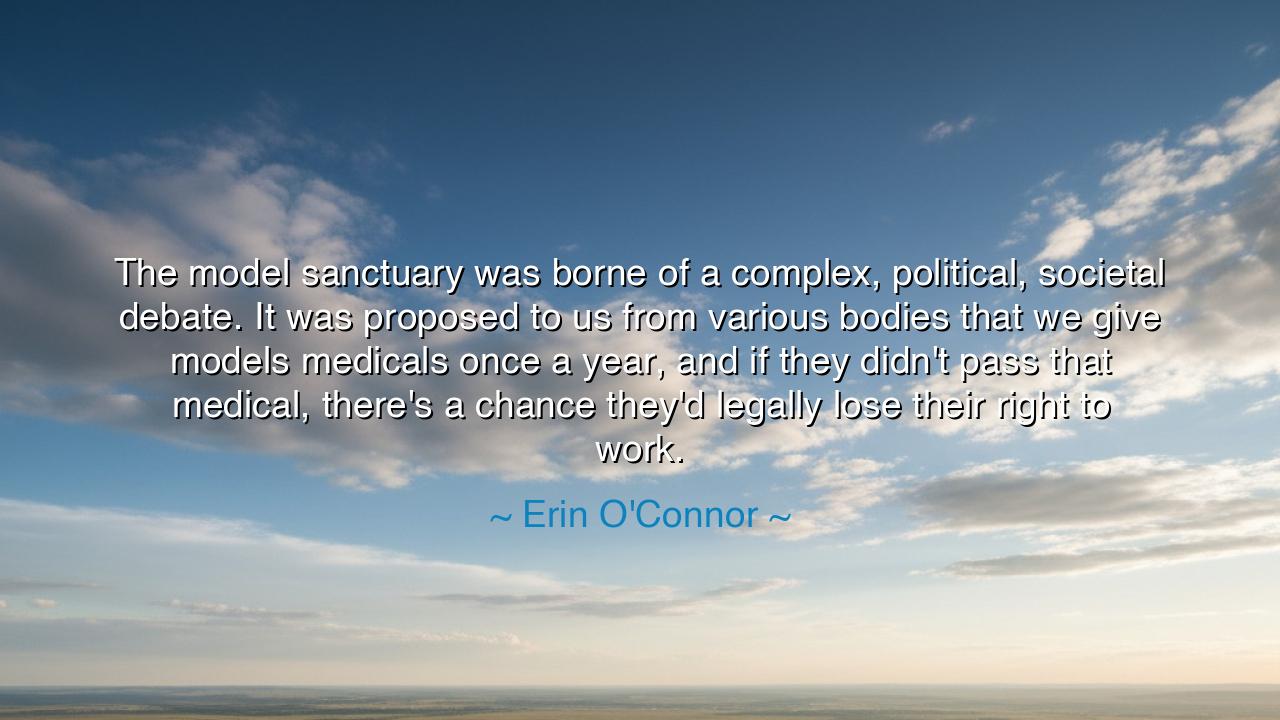
The model sanctuary was borne of a complex, political, societal
The model sanctuary was borne of a complex, political, societal debate. It was proposed to us from various bodies that we give models medicals once a year, and if they didn't pass that medical, there's a chance they'd legally lose their right to work.






The words of Erin O’Connor—“The model sanctuary was borne of a complex, political, societal debate. It was proposed to us from various bodies that we give models medicals once a year, and if they didn't pass that medical, there's a chance they'd legally lose their right to work.”—speak with the weight of conflict between freedom and protection, between the demands of an industry and the dignity of the human body. In them we hear not only the struggle of fashion, but the ancient question of how societies balance ambition, health, and law. To create a sanctuary for models was not a simple matter of kindness; it was forged in the fire of political and societal debate, born from both concern and controversy.
From the earliest civilizations, societies have wrestled with this same tension: how much of a person’s body belongs to themselves, and how much is demanded by their trade, their rulers, or their culture. In the gladiatorial arenas of Rome, men fought to the death for spectacle, and though their strength was admired, their humanity was disregarded. In the factories of the Industrial Revolution, young children labored until their health broke, sacrificed for the progress of industry. So too, in the modern age, the world of models—where beauty is currency—has often demanded sacrifices that erode health and spirit. O’Connor’s words reveal a moment when society paused and asked: shall we let this continue unguarded, or shall we place protections, even if they limit freedom?
The call for annual medicals was born of rising awareness. For years, the fashion industry was criticized for glorifying extreme thinness, for pushing young men and women to unhealthy extremes in pursuit of beauty defined by others. Stories emerged of illness, of collapse, even of death. To require a health check was an attempt to anchor the industry to humanity, to remind the world that beneath the garment and the photograph stands a fragile body, a living soul. Yet the cost of such laws was heavy: to fail meant to lose not only health but livelihood, to be deemed unfit not by one’s talent, but by one’s medical record.
Consider the story of Isabelle Caro, the French model who exposed the cruelty of these standards by revealing her battle with anorexia. In her courage to show her suffering, she forced society to confront the reality behind the glamour. Her story became a rallying cry for reform, one of the sparks that ignited the debates O’Connor recalls. Caro’s life reminds us that the issue is not abstract—it is lived in flesh and blood, in the pain of individuals who bore the weight of an industry’s impossible demands.
The sanctuary O’Connor describes is not simply a law or a policy; it is symbolic. It represents society’s struggle to protect without oppressing, to heal without shaming, to balance care with respect for autonomy. It is a sanctuary not only for models, but for all who labor under systems that value them for parts rather than for wholes. To debate such matters is to grapple with the essence of justice itself.
The meaning of her words for us is profound. They remind us that industries, no matter how glamorous, are made of people, and people must not be consumed in the pursuit of profit or perfection. To demand beauty at the cost of health is to betray beauty itself. To protect health, even if it limits opportunity, is to affirm that life is worth more than spectacle. This is a truth as old as humanity, repeated in every generation’s struggle between profit and dignity, between freedom and care.
The lesson is clear: in every sphere of life—fashion, labor, sport, or art—we must ask not only what people produce, but what it costs them. Health and dignity must never be sacrificed upon the altar of ambition. Practical action lies before us: support systems that protect the vulnerable, question industries that exploit, and remember that behind every image and performance stands a human soul. Let us respect them, not only for what they give us, but for who they are.
So let Erin O’Connor’s words be carried forward as both caution and hope: that sanctuaries, though born of debate and controversy, are necessary. They remind us that beauty is hollow if it destroys, and that true respect for any industry begins with respect for the bodies and lives of those within it. May we remember this truth and weave it into the fabric of our own choices, so that no pursuit of excellence ever tramples upon the health of the human spirit.






AAdministratorAdministrator
Welcome, honored guests. Please leave a comment, we will respond soon